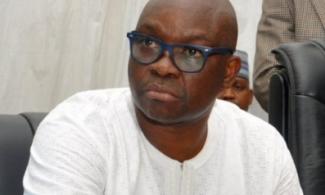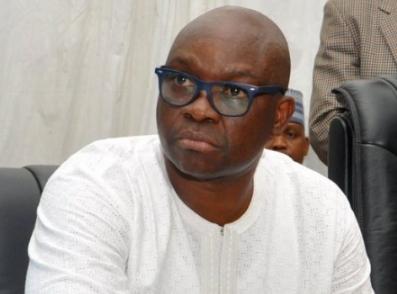
Recently, the media, both print and electronic, has been a washed by several opinions and ideas about the recent freezing of Governor Ayodele Fayose’s account by the EFCC. While some believe that the anti-corruption agency is right and have all the powers under the sky to so freeze the accounts, others there are, who believe that the Commission have no power under the law to freeze the account of the Governor.
Recently, the media, both print and electronic, has been a washed by several opinions and ideas about the recent freezing of Governor Ayodele Fayose’s account by the EFCC. While some believe that the anti-corruption agency is right and have all the powers under the sky to so freeze the accounts, others there are, who believe that the Commission have no power under the law to freeze the account of the Governor.
Those who believe that the Governor’s account ought not to be frozen based their arguments on the fact that the Governor has immunity under Section 308 of the constitution. For the purpose of completeness, Section 308 provides inter alia, that no civil or criminal proceedings shall be instituted or continued against a person to whom this Section applies during his period of office.
Looking at the above provision, it is crystal clear that a person to whom the Section applies cannot be sued in any criminal or civil proceedings before any Court of law in Nigeria. Thus, the question to ask is, can the Section be reasonably invoked to shield a Governor or President from being investigated? The answers I submit, is in the negative. The truth is that the authors of these ignis fatuum or bogus thesis of immunity clause being a universal talisman to shield a Governor from prosecution are getting hold of the wrong end of the stick and allowed their exaggerated understanding of the immunity provision to cover investigation. Before going further, it is necessary to define the word “investigation” which has been defined to mean “the act in investigating, the process of inquiring into or following up, research, study, inquiring” or an official examination of the facts about a situation, crime etc. see oxford dictionary 8th edition By this definition, it is very clear that investigation is a different ball game and it is miles apart from prosecution. In other words, investigation which is the act of gathering information and making findings by collating facts and evidence is a step before a person is charged to court. However, in the instant case, freezing of Governor Fayose’s Account is part of the investigation carried out by the anti-corruption agency and this singular act cannot be said to have violated the right of the Governor under the law, especially, as it relates to the immunity enjoyed by him. According to professor Dias of the University of Cambridge, “originality of thought is ensured by a breath of view, a sense of perceptive and sympathetic appreciation of what people have said and are still saying” To this end, the views held by those supporting the Governor and those supporting the anti-corruption agency can only better be appreciated if we take a que from the available precedent which is judicial pronouncement. Thus, in Fawehinmi v. I.G.P. (2002) (Pt.767), the Supreme Court had this to say;
“That a person protected under Section 308 of the 1999 Constitution going by its provision, can be investigated by the Police for an alleged crime or offence is, in my view, beyond dispute. To hold otherwise is to create a monstrous situation whose manifestation may not be fully appreciated. I shall give three possible instances. Suppose it is alleged that a Governor, in the course of driving his personal car, recklessly ran over a man, killing him; he sends the car to a workshop for the repairs of the dented or damaged part or parts. Or that he used a pistol to shoot a man dead and threw the gun into a nearby bush. OR THAT HE STOLE PUBLIC MONEY AND KEPT IT IN A PARTICULAR BANK or used it to acquire property. Now if the Police became aware, could it be suggested in an open and democratic society like ours that they would be precluded by Section 308 from investigating to know the identity of the man killed, the cause of death from autopsy report, the owner of the car taken to the workshop and if there is any evidence from the inspection of the car that it hit an object recently, more particularly a human being; or to take steps to recover the gun and test for ballistic evidence; and generally to take statements from eye witnesses of either incident of killing or TO FIND OUT (IF POSSIBLE ) ABOUT THE MONEY LODGED IN THE BANK OR FOR ACQUIRING PROPOERTY, AND TO GET PARTICULARS OF THE ACCOUNT AND THE SOURCE OF THE MONEY OR OF THE PROPERTY ACQUIRED? The Police (in this case, the EFCC) clearly have a duty under Section 4 of the Police Act to do all they can to investigate and preserve whatever evidence is available. The evidence or some aspect of it may be the type which might be lost forever if not preserved while it is available. (Emphasis supplied for effect).
A close and analytical dissection of the above case, especially the very apt example of Justice Uwaifo says it all and leaves no one in any iota of doubt that the EFCC do not only have the power to freeze the account of Governor Fayose but also there is no better way of carrying out their investigation than this. May I also submit further that EFCC of today has a good head on its shoulders and it is working on all cylinders to fight corruption within the ambit of the law or due process. Therefore, we must strive to ensure that we do not deter them on their way to achieving these noble ideals.
Furthermore, there is this commanding misunderstanding or lumping of the words “investigation” and “prosecution” together and the meaning they conveyed eventually keeps agitating the minds of Fayose and all those who shared his parochial sentiments that he cannot be investigated. It becomes necessary for a further understanding of the impugnant arguments and contention of Fayose and those who support him that the immunity enjoyed by him should shield his account from being frozen. It is humbly submitted that this contention steps the law on the face.
This is because the immunity provision in Section 308 of the constitution applies only to the person who occupies the office of a governor and not to his property of which his bank account is or to the property of the state he governors. For if that were to be so, then a time will come that the cars of a governor who hit and kill its victim will be held to be covered by immunity or better still, their wife and children, and this will not augur well for us as a people.
In addition, Section 34 of the EFCC Act permits the Commission to freeze the account of anyone if same is reasonably suspected to have been used for some fraudulent transaction or dealings. The freezing of account under Section 34, is made through an ex-parte application for the Court to make an order freezing the account. This seems to be where the problem is. Some have argued that by the fact that this application has to be made to the Court, it presupposes that the Governors name must have appeared on the process. This contention has no basis in law, good attempt though, it is a wingless bird that cannot fly. The reason for this is that those holding this view did not consider the provision of the Act with regards to account freezing for the abundance doubt,. Under the schedule to the Act, form B is used to freeze the account and it is majorly directed to the Bank Manager instructing him to freeze a specified account. Thus, the governor is never a party to such proceedings and to that extent, the arguments that his name would appear in a process of court is not only misleading but baseless.
Stretched further, the money in issue has been established not only by the EFCC but by the Governor himself to be the money for his election, which the EFCC has traced or linked with the loot from the Office of the National Security Adviser (ONSA). Meanwhile, since the account of the ONSA has been attached based on a court order, all the monies that leave that account to another account can be intercepted without necessarily going to seek any further order from the Court. Also, it is only practical that these accounts of Governor Fayose be frozen because as at today, so much of the nation’s funds have been trapped in foreign countries and getting them back has been so difficult if not impossible. That being the case, the freezing of the account pursuant to investigation is a pragmatic approach and a step in the right direction. This is because if no step is taken to intercept the suspected money, same will definitely be depleted or moved away from the shores of Nigeria either to Dubai or other European Countries. Thus, to expect the anti-corruption agency to wait till Fayose leaves office in years to come is to preach the impossibility and impracticability.
Recently, the Security Agencies stopped the Kogi State governor from traveling abroad based on their investigative and security reports and of course, notwithstanding any immunity clause. I submit that people should wake up from their slumber and wake up to smell the coffee that we are now in civil rule (though not yet democracy). Gone are the days of impunity and its oppressive reign because on the throne now sits due process and respect for the rule of law. Long live rule of law and farewell to rule of whims
Before I rest anchor on this issue, the money in issue was given to Fayose before he became the Governor. Therefore, no Governor has any immunity against electoral offences and thus, he can very well be prosecuted. To do otherwise will mean to carry the intendment and objective of the law on immunity to a very ridiculous extent. God forbid!!
Kabir Akingbolu, Esq.
